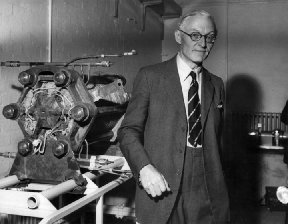
Francis Thomas Bacon was born on December 21, 1904, and died on May 24, 1992. He was a direct descendent of Sir Francis Bacon (1561–1626), philosopher and sometimes called the father of empiricism and the scientific method. Tom, as he was called by his friends, obtained a bachelor's degree from Trinity College in the Mechanical Sciences Tripos, a predecessor to Engineering. He then worked for C.A. Parsons and Co., a firm named for its founder and a pioneer in the development of the modern steam turbine.
In 1932, a pair of articles in Engineering set Tom's professional life on a new course: “The Erren Hydrogen Engine,” and “Gas-Operated Vehicle.” The idea was to store hydrogen generated from electricity during off-peak hours, and then use it in an internal combustion engine. Rather than directly injecting and burning the hydrogen as originally conceived, Bacon envisioned reversing the electrolysis process and somehow recombining the hydrogen and oxygen to generate electrical power. He had yet to hear of the concept of a fuel cell, but immediately started working on the idea. This electrochemical process should be more efficient than a thermal device, which is limited by the Carnot efficiency. Since a fuel cell didn't fit within the core business of C.A. Parsons and Co., he left the company in 1940 after several years of working surreptitiously at the office and at home on fuel ...
Get Electrochemical Engineering now with the O’Reilly learning platform.
O’Reilly members experience books, live events, courses curated by job role, and more from O’Reilly and nearly 200 top publishers.

